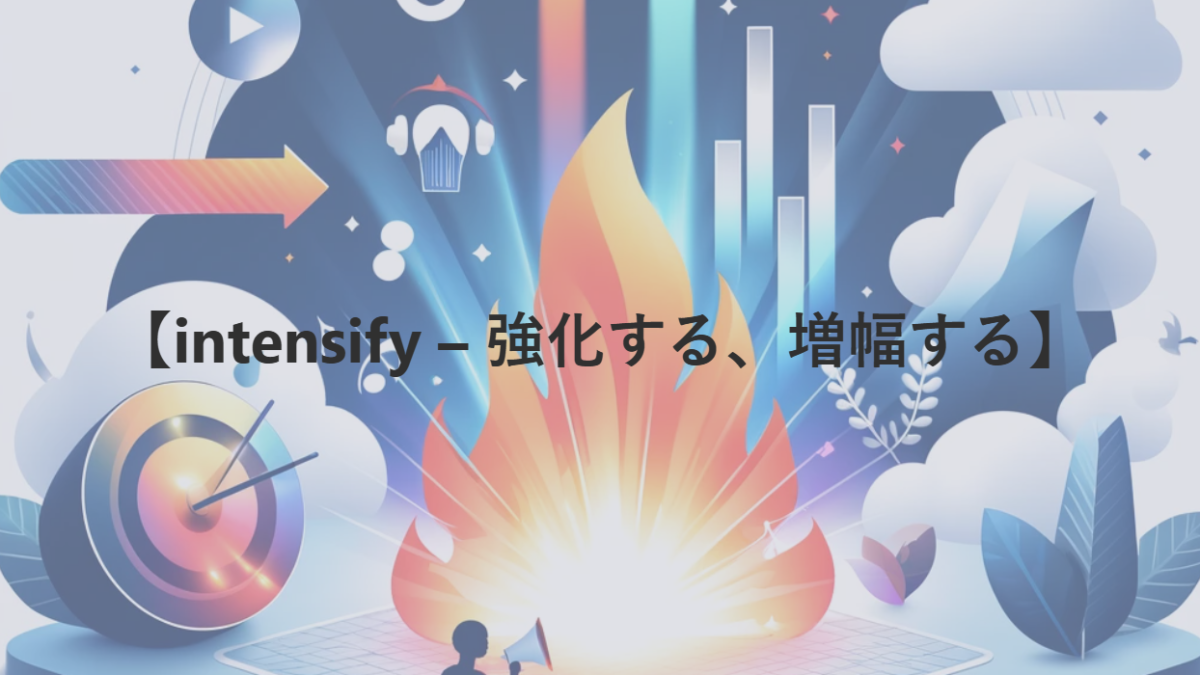語源・類義語・反対語・例文
【intensify – 強化する、増幅する】という単語の語源とか由来を知っていますか?
「Intensify」の語源は、ラテン語の「intensus」に由来しています。これは「intendere」から派生した単語で、「緊張する」や「ストレッチする」という意味を持ちます。「Intensus」は「強い」や「緊張した」という意味で、ここから英語の「intense」(激しい、強烈な)が生まれました。「Intensify」は19世紀初頭に英語に現れ、何かを「強める」、「増幅する」または「高める」という行為を指すようになりました。この単語は、感情、行為、現象などの強度や程度を高めることを表すために使用されます。
The etymology of “intensify” originates from the Latin “intensus,” which is derived from “intendere,” meaning “to stretch” or “to strain.” “Intensus” conveys the sense of “intense” or “strained,” from which the English “intense” (meaning fierce or strong) emerged. “Intensify” appeared in the English language in the early 19th century and became associated with the act of “strengthening,” “amplifying,” or “enhancing” something. The word is used to describe the action of increasing the strength, degree, or magnitude of emotions, actions, phenomena, and more.
この単語の類義語・反対語を教えてください。
類義語:
- Strengthen – 強化する: 力や影響を増すこと。
- Amplify – 増幅する: 音量や効果を大きくすること。
- Enhance – 高める: 品質や価値を改善すること。
- Escalate – 段階的に拡大する: より高いレベルや程度へと進むこと。
- Heighten – 高める: 状態や感情をより強くまたはより鮮明にすること。
反対語:
- Weaken – 弱める: 力や影響を減少させること。
- Reduce – 減少させる: 量や程度を下げること。
- Diminish – 減少する: サイズ、重要性、または強度が小さくなること。
- Lower – 低くする: レベルや状態を下げること。
- Alleviate – 軽減する: 痛みや苦しみを和らげること。
この単語に似た単語で間違いやすい単語はありますか?
- Intensive: これは形容詞で、「集中的な」や「徹底的な」という意味を持ちます。何かが非常に集中されたり、深く徹底されたりする様子を表しますが、「intensify」のように動作や状態を強化する動詞ではありません。
- Intent: これは名詞または形容詞で、目的や意図を意味します。人が何かを行う「意図」や「目的」を示しますが、「intensify」のように何かを強めるという意味ではありません。
- Intentional: 形容詞で、「意図的な」や「故意の」という意味を持ちます。何かが意図的に行われる様子を表しますが、「intensify」とは異なり、強化や増幅とは直接関係がありません。
この単語にまつわるエピソードなどはありますか?
例えば、気候変動によって激しい天候が「intensify」されるというニュース報道があります。これは、嵐、熱波、降雨などが以前よりも激しく、頻繁に発生するようになったことを指します。
また、「intensify」は感情や関係の文脈でも使用されます。二人の人物間での感情が「intensify」するという話は、彼らの間の感情がより強く、深まっていることを示します。
政治的または社会的な文脈では、「抗議活動がintensifyする」という表現が使われることがあります。これは、活動がより活発かつ激しくなり、その影響力が増大していることを意味します。
これらの例は、「intensify」がどのように日常生活、自然現象、感情的な体験、政治的または社会的な動きなど、様々な文脈で使用されるかを示しています。直接的なエピソードではないものの、これらのシナリオは「intensify」の概念が現実の状況にどのように適用されるかを表しています。
There isn’t a specific story or anecdote directly associated with the word “intensify,” but it is used in various contexts, leading to numerous conceivable situations and examples. For instance, the concept of “being intensified” appears in scenarios such as natural phenomena, personal emotions, and political situations.
For example, there are news reports on how extreme weather has been “intensified” due to climate change. This refers to storms, heatwaves, and rainfall becoming more severe and frequent than before.
Additionally, “intensify” is also used in the context of emotions and relationships. A story about the feelings between two individuals “intensifying” suggests that their emotions towards each other are becoming stronger and deeper.
In political or social contexts, the expression “protests intensify” might be used. This indicates that the activities are becoming more vigorous and intense, increasing their impact.
Although these examples are not direct anecdotes, they illustrate how “intensify” can be applied in various contexts such as everyday life, natural events, emotional experiences, and political or social movements. These scenarios demonstrate how the concept of “intensify” is applied to real-life situations.
この単語を使った例文を5つほど教えてください。
The storm intensified, bringing heavy rain and strong winds.
(嵐は激しさを増し、大雨と強風をもたらした。)
They decided to intensify their efforts to meet the deadline.
(彼らは締め切りに間に合わせるために取り組む努力を強化することに決めた。)
The company plans to intensify its marketing campaign to attract more customers.
(会社はより多くの顧客を引きつけるためにマーケティングキャンペーンを強化する予定です。)
The coach asked the players to intensify their focus during the crucial moments of the game.
(コーチは選手に試合の重要な瞬間に集中力を高めるように求めました。)
The conflict between the two countries intensified, leading to an escalation of tensions.
(両国間の紛争は激化し、緊張が高まる結果となった。)
【intensify – 強化する、増幅する】のコロケーション
- Intensify efforts(努力を強化する): ある目的や目標に対する努力や取り組みをより強く、より集中的にすることを意味します。たとえば、災害救助活動やプロジェクトの完了に向けての努力を増す場合に使われます。
- Intensify pressure(圧力を強化する): ある人や組織に対する圧力や要求を増やすことを指します。これは、政治的な文脈や交渉の場でよく使われる表現です。
- Intensify scrutiny(検査を強化する): 調査や監視をより厳しく、徹底的にすること。このフレーズは、不正行為の疑いがある場合や、品質管理のプロセスで使用されることがあります。
- Intensify the conflict(紛争を激化する): 紛争や対立がより深刻または激しいものになること。この表現は、国際関係や社会内の対立が悪化する状況を描写するのに使われます。
- Intensify the pain(痛みを増幅する): 物理的または精神的な痛みをさらに強く感じさせること。これは医療の文脈や、個人の体験を説明する際に使用されます。
「Intensify」という単語は、多くの異なる文脈で使われ、特定の状況や活動を強化、増幅する際に登場する一般的なフレーズや組み合わせが存在します。ここで紹介するのは、「intensify」を含む一般的なコロケーション(語の組み合わせ)とそれらがどのような文脈で使用されるかに関する解説です。
まず、「Intensify efforts」とは、目標達成に向けての努力や取り組みをさらに強めることを意味します。災害救助やプロジェクトの成功を目指して、人々がより一層のエネルギーと資源を投入する状況を表します。
次に、「Intensify pressure」という表現は、特定の個人や組織に対して圧力や要求を増加させることを指します。政治的なシナリオやビジネス交渉において、より強い結果を引き出すために使われることがあります。
「Intensify scrutiny」は、検査や監視の程度を高めることを示します。品質管理や安全性の確保、不正行為の調査など、様々な状況でこのフレーズが適用されます。
また、「Intensify the conflict」というフレーズは、対立や紛争がより深刻かつ激しくなる状況を表します。この言葉は、国際的な争いや社内の不和を説明する際にしばしば使われます。
最後に、「Intensify the pain」は、痛みがより強く、深刻になることを意味します。これは物理的な苦痛だけでなく、精神的な苦痛を表すのにも使用され、医療の文脈や個人の感情を説明する際に役立ちます。
これらの例は、「intensify」という単語がどのようにして日常生活、政治、健康、そして社会的な文脈で活用されるかを示しており、それぞれのフレーズは、強化や増幅の概念を様々なシナリオや状況に応用する方法を反映しています。
The word “intensify” is used in a variety of different contexts, and there are common phrases or combinations that appear when specific situations or activities are being enhanced or amplified. Here we present some typical collocations involving “intensify” and explain how they are used in different contexts.
Firstly, “Intensify efforts” means to increase the efforts or endeavors toward achieving a goal. This situation describes scenarios where individuals invest more energy and resources to ensure the success of disaster relief or project completion.
Next, the expression “Intensify pressure” refers to increasing pressure or demands on a particular individual or organization. It is often used in political scenarios or business negotiations to elicit stronger outcomes.
“Intensify scrutiny” indicates raising the level of inspection or monitoring. This phrase applies in various situations such as quality control, safety assurance, or investigations into misconduct.
Furthermore, “Intensify the conflict” describes a situation where a dispute or conflict becomes more severe and intense. This term is frequently used to describe international disputes or internal discord.
Lastly, “Intensify the pain” signifies an increase in the severity of physical or emotional pain. This can be used not only to describe physical suffering but also mental anguish and is valuable in medical contexts or in explaining personal feelings.
These examples demonstrate how the word “intensify” can be utilized in everyday life, political, health, and social contexts. Each phrase reflects different ways in which the concept of strengthening or amplification can be applied across various scenarios and conditions.
文法問題: “intensify” (強化する、増幅する)
- 動詞の形:
The company plans to _________ its marketing efforts in the coming months.
(A) intensify
(B) intensified
(C) intensifying
(D) intensifies
解答と解説:
(A) intensify to 不定詞の後には動詞の原形が来ます。
– - 目的語との組み合わせ:
The conflict between the two countries _________ after a border skirmish.
(A) intensified
(B) intensified on
(C) intensified for
(D) intensified of
解答と解説:
(A) intensified intensify は自動詞で、目的語を直接取りません。前置詞も不要です。 - 名詞形:
The _________ of the storm caused widespread damage.
(A) intensify
(B) intensified
(C) intensifying
(D) intensification
解答と解説:
(D) intensification 空欄には主語となる名詞が必要です。intensification は「強化」「激化」という意味の名詞です。
– - 類義語:
The coach urged the team to _________ their efforts in the second half of the game.
(A) intensify
(B) strengthen
(C) escalate
(D) all of the above
解答と解説:
(D) all of the above intensify, strengthen, escalate はいずれも「強化する」「激化させる」という意味で、この文脈ではすべて適切です。
– - 誤文訂正:
The intensifying competition in the market forced companies to innovate.
解答と解説:
誤りはありません。 この文は、「市場における競争の激化は、企業に革新を強いた」という意味で、intensifying が正しく使われています。

